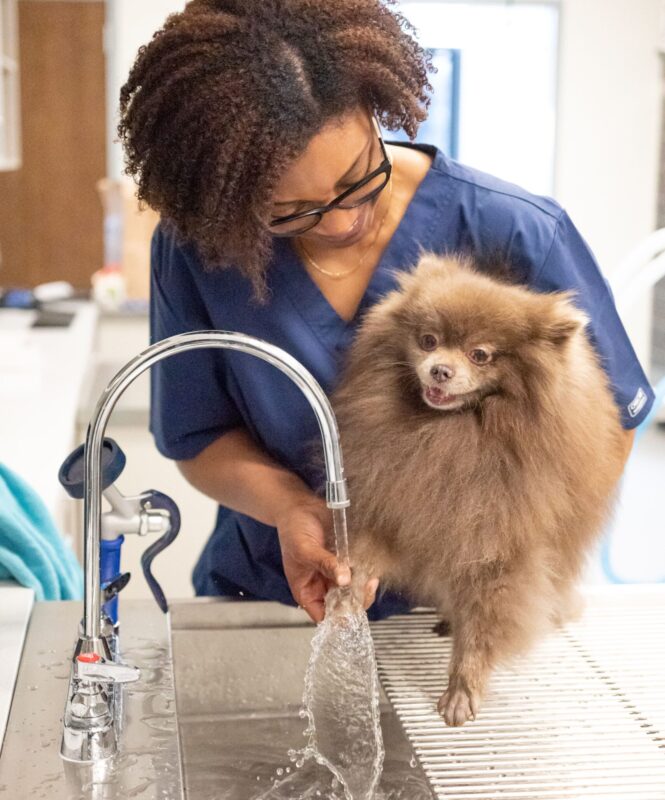Wellness Exams & Preventative Care
In East Meadow, Long Island, NY
The Importance of Preventative Care

Preventative Care
What is preventative care? It’s the most important part of your pet’s health care regimen. It’s much better to identify and prevent diseases before they become major issues, which is why we recommend twice yearly Wellness Examinations (every 6 months) for all pets. Cat and dog biology, and thus disease, progresses much faster than that of human beings. Should your pet develop specific health issues or experience advanced age, expect us to recommend even more diligent monitoring to keep your pets as healthy, happy, pain-free, and comfortable as possible! That isn’t the only preventative care we offer at Oath Animal Hospital.
Examinations
Just like a physician recommends regular wellness exams to his patients, veterinarians recommend regular wellness exams to their patients – your pets. It is advantageous to recognize a potential health concern during early stages to increase the likelihood of treatment success, while minimizing expense and difficulty. The act of curing an existing condition can be financially burdensome, however, prevention methods are much more affordable! We will recommend a wellness plan based on several factors such as your pet’s breed, age, lifestyle, and overall health.
Wellness exams typically include:
- A complete nose-to-tail physical exam – this helps us evaluate major bodily systems and create a health profile
- Discuss your pet’s behavior, diet, exercise habits, and regular activity
- Recommend necessary vaccinations and diagnostics
- Note changes in health and any indications of illness, such as weight loss or weight gain, which helps us identify health concerns before they progress
- Address any questions or concerns you may have
Vaccinations
With over 50 million pets living in the United States, your companion is bound to come in contact with an infectious condition. We evaluate your pet’s lifestyle and unique risk factors to only administer the most relevant vaccines and recommend only the most appropriate preventatives. We strive to reduce over-vaccination, which is why our veterinarians use custom, up-to-date vaccine protocols, including multi-year vaccines whenever possible, customized to each pet’s environment and lifestyle.
Parasite Prevention
We now know that parasites – fleas, ticks, heartworms, and intestinal worms – are more than a nuisance and can actually threaten your pet with grave illness and even death. Some diseases can be transmissible to people, the elderly, and even young children so we aim to protect your pet and prevent parasite infestation before it happens by routinely testing for parasites and using safe and effective preventative medications.
Fleas and Ticks
We can discuss the best treatment options based on your environmental situation and review ways to control fleas in your home, yard and on your pet.
- Fleas and ticks are external parasites that irritate the skin and transmit diseases into your pet
- Ticks can transmit many diseases, including Lyme disease
- Fleas can transmit many diseases, including tapeworms and Bartonella
- Fleas can cause skin allergies that are common in cats and dogs
- Ticks latch on to the skin and feed on blood
- Once-a-month products are available to prevent fleas and ticks
- It is important to visually examine your pet for signs of fleas during daily grooming and check for ticks after being in a risky area, such as a wooded camping site
Intestinal Parasites
Depending on your pet’s lifestyle, fecal testing is recommended annually or semi-annually. Dogs and cats are commonly infected with internal parasites that can also be passed to humans. Not only does this pose a threat to your pet, but also the general public. Parasites are present in virtually all areas of the U.S. This results in a fairly high infection rate in puppies and kittens. Roundworms are a significant cause of blindness in children.
Heartworm
Heartworms are harmful but also preventable! We recommend annual testing as well as monthly preventatives all year round which can easily be shipped to you through our online pharmacy.
- Mosquitos spread heartworms!
- Adult heartworms reside in the right side of the heart
- Heartworms are 6-14 inches long and hundreds may be present in one dog!
- Heartworms impair blood circulation, which results in damage to the heart, lungs, liver and kidneys
- Significant damage (possibly death) may occur prior to any outward symptoms” and should be the bullet point right after “Advanced symptoms include
- Advanced symptoms include difficulty breathing, coughing, tiring easily, low energy, loss of weight, fainting, and death
- We recommend heartworm prevention for cats as well, since they can also be affected – in fact, 5% of heartworm-positive cases are indoor-only cats
- Heartworms have been found in the United States (every state) and Canada
Microchipping
Microchip implantation is essentially painless and provides lifelong protection and identification for your pet. The procedure is similar to a routine vaccination aand is implanted between the shoulder blades because it is known to be an area with more fatty tissue, and less nerves and blood vessels. Unlike a collar, a microchip can never fall off, be lost, altered, or intentionally removed.
Nutrition & Weight Management
An estimated 52.7% of dogs and 57.9% of cats in the United States are overweight or obese.
More food does not mean more love! It may be difficult to deny your pet human food – however, it is important to remember that your pet’s nutritional needsdiffer from your own! We aim to “feed the patient, not their bowl! Factors such as age, health condition, gender, weight, and breed effect overall recommended nutrition, whether that is a specialized diet or simply a balanced diet.
If your pet is experiencing nutritional challenges such as liver disease, renal failure, bladder and kidney stones, food allergies, or obesity, we are able to offer you advice and solutions.
Behavior Counseling
Health concerns can begin with or be influenced by behavioral problems. Healthy pets may also need behavioral training to prevent disruption at home and with family life. We are trained and experienced in understanding pet’s behavior, preventing behavioral problems, and resolving various unwanted behaviors. We are happy to provide you with training tips and recommendations to help with the behavioral modification process.



